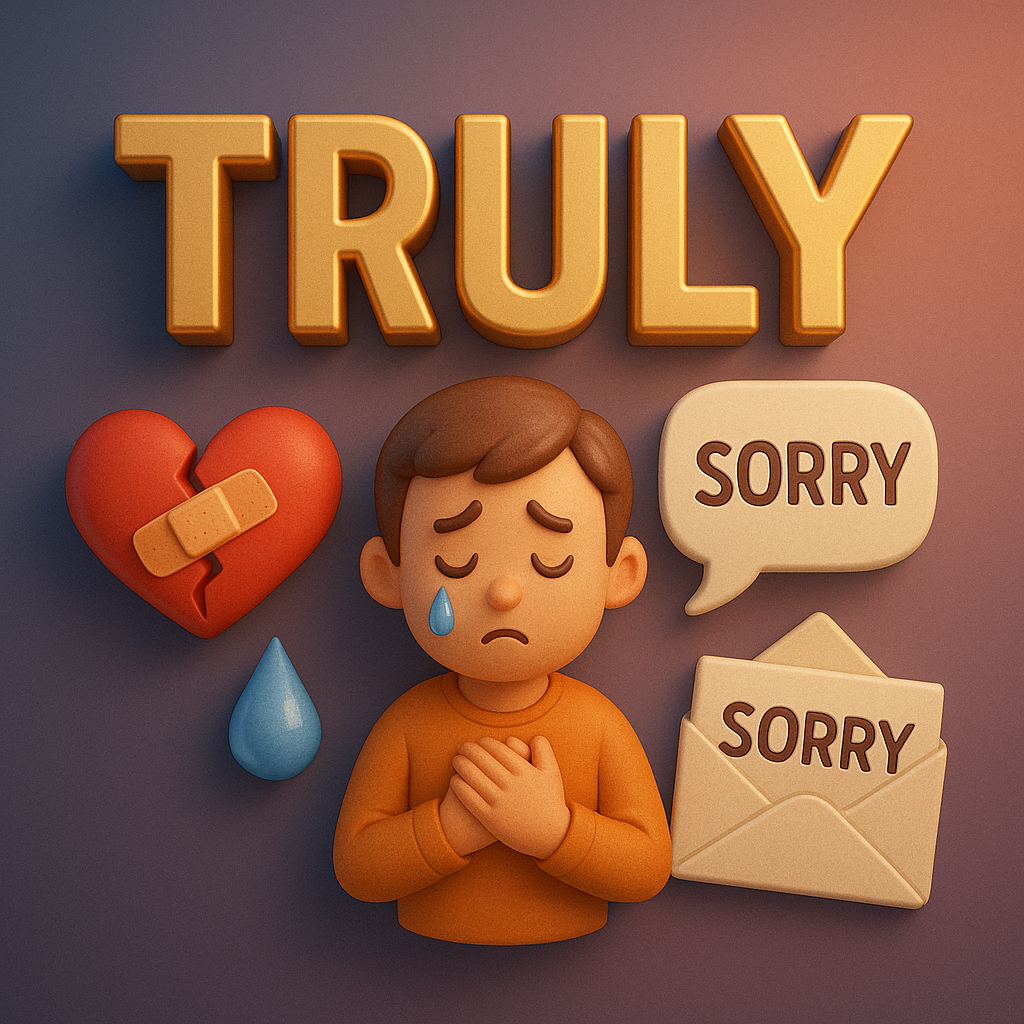Truly
Definition
Truly refers to something done in a truthful, genuine, or accurate manner, or to emphasize sincerity or authenticity.
Parts of Speech
- Adverb
Pronunciation
American English
- IPA Pronunciation: /ˈtruː.li/
- Respelling: TROO-lee
British English
- IPA Pronunciation: /ˈtruː.li/
- Respelling: TROO-lee
Etymology
The word "truly" originates from Middle English "trewly," derived from Old English "trēowlīce," which combines "trēowe" (faithful, true) and the adverbial suffix "-līce" (similar to "-ly" in Modern English).
Derivatives
- Truth (noun)
- Truthful (adjective)
- Trueness (noun)
- Untruly (adverb, archaic)
- Trulyness (noun, rare)
Synonyms
- Honestly
- Sincerely
- Genuinely
Antonyms
- Falsely
- Deceptively
- Insincerely
Usage
The adverb "truly" is commonly used to express sincerity or genuine truth, as in "I truly appreciate your help." It can also emphasize accuracy, as in "This is truly remarkable."
Related Terms
- Truth: The quality or state of being true.
- Authentic: Genuine or real.
- Faithful: Loyal and accurate.
Detailed Definitions
Adverb
- In a truthful or accurate manner: Refers to something being done or said without falsehood.
- Example: "She truly believes in their mission."
- To emphasize sincerity or authenticity: Used to convey heartfelt or genuine sentiment.
- Example: "I am truly sorry for what happened."
- Absolutely or really: Refers to something to a great or complete extent.
- Example: "The view was truly breathtaking."
truly



🇨🇳 Mandarin (Simplified Chinese)
- 真正地 (In a truthful manner)
- IPA: /tʂən˥˥.tʂəŋ˥˥.ti/
- English Respell: zhēnzhèng de
- 真诚地 (In a sincere manner)
- IPA: /tʂən˥˥.ʂʰəŋ˥˥.ti/
- English Respell: zhēnchéng de
🇮🇳 Hindi
- सचमुच (In a truthful manner)
- IPA: /sʌt͡ʃmuʧ/
- English Respell: sachmuch
- ईमानदारी से (In a sincere manner)
- IPA: /iːmaːndaːriː seː/
- English Respell: imaandari se
🇪🇸 Spanish
- Verdaderamente (In a truthful manner)
- IPA: /berðaðeˈɾamente/
- English Respell: verdaderamente
- Sinceramente (In a sincere manner)
- IPA: /sinθeɾaˈmente/
- English Respell: sinceramente
🇫🇷 French
- Vraiment (In a truthful manner)
- IPA: /vʁɛ.mɑ̃/
- English Respell: vraiment
- Sincèrement (In a sincere manner)
- IPA: /sɛ̃.sɛʁ.mɑ̃/
- English Respell: sincèrement
🇸🇦 Modern Standard Arabic
- بالحقيقة (In a truthful manner)
- IPA: /bɪlħaːqɪːqa/
- English Respell: bilhaqiqah
- بإخلاص (In a sincere manner)
- IPA: /biːxlɑːs/
- English Respell: bi'ikhlas
🇧🇩 Bengali
- সত্যিই (In a truthful manner)
- IPA: /ʃotti/
- English Respell: sotti
- স্বাচ্ছন্দ্যে (In a sincere manner)
- IPA: /ʃʷatʃʰɔnde/
- English Respell: swachchhandye
🇷🇺 Russian
- Действительно (In a truthful manner)
- IPA: /dʲɪjstvʲɪˈtʲelʲnə/
- English Respell: deystvitel'no
- Искренне (In a sincere manner)
- IPA: /ɪˈskrʲenʲɪj/
- English Respell: iskrenne
🇵🇹 Portuguese
- Verdadeiramente (In a truthful manner)
- IPA: /vɨɾðɐðɐjɾɐˈmẽt(ɨ)/
- English Respell: verdadeiramente
- Sinceramente (In a sincere manner)
- IPA: /sĩsɨɾɐˈmẽt(ɨ)/
- English Respell: sinceramente
🇮🇩 Indonesian
- Benar-benar (In a truthful manner)
- IPA: /bəˈnarbəˈnar/
- English Respell: benar-benar
- Tulus (In a sincere manner)
- IPA: /ˈtulus/
- English Respell: tulus
🇩🇪 German
- Wahrhaftig (In a truthful manner)
- IPA: /ˈvaːɐ̯haftɪç/
- English Respell: wahrhaftig
- Aufrichtig (In a sincere manner)
- IPA: /ˈaʊ̯fʁɪçtɪç/
- English Respell: aufrichtig
🇯🇵 Japanese
- 本当に (In a truthful manner)
- IPA: /hontōni/
- English Respell: hontō ni
- 誠実に (In a sincere manner)
- IPA: /seidʑitsuni/
- English Respell: seijitsu ni
🇻🇳 Vietnamese
- Thật sự (In a truthful manner)
- IPA: /tʰâːt̚˦ˀ˥ʂɨ˧ˀ˨ʔ/
- English Respell: thật sự
- Chân thành (In a sincere manner)
- IPA: /câːn tʰəːŋ˧/
- English Respell: chân thành
🇰🇷 Korean
- 정말로 (In a truthful manner)
- IPA: /tɕʌŋmallo/
- English Respell: jeongmallo
- 성실히 (In a sincere manner)
- IPA: /sʌŋʃilhi/
- English Respell: seongsilhi
🇹🇷 Turkish
- Gerçekten (In a truthful manner)
- IPA: /ɟeɾˈtʃekt̪en/
- English Respell: gerçekten
- Samimiyetle (In a sincere manner)
- IPA: /sɑmiːmiːjetle/
- English Respell: samimiyetle
🇵🇰 Urdu
- سچ مچ (In a truthful manner)
- IPA: /sʌt͡ʃ mʌt͡ʃ/
- English Respell: sach much
- خلوص سے (In a sincere manner)
- IPA: /xʊloːs seː/
- English Respell: khuloos se





